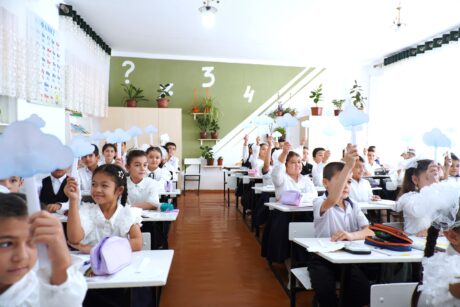Think back to your first day of school. Were you excited to make new friends? Did you feel comfortable in your school? Who was in your classroom?
Everyone has the right to be a part of their community, and school is where children first experience and build a community outside of their family. These early experiences show us who and what is valued by society and profoundly affect our education outcomes, the life choices we make and the way our communities work.
As we celebrate International Day of Persons with Disabilities, we have an opportunity to reflect on the ways that schools act as enabling or disabling environments.

Many children with disabilities experience segregation, discrimination and tracking. These are limits set for children by adults, often with good intentions and preconceived ideas about what is possible. In the spirit of “nothing about us without us” we can advocate for inclusive education to center children with disabilities in the choices and opportunities of their own participation in education.
Inclusive education is a simple concept: all teachers work with all children. Children live at home, attend their neighborhood school and participate in the same classes as everyone else in their grade.
Inclusive education allows all children to benefit from teachers working to meet the needs of each individual student as part of the classroom community. In practice, most education systems need to make substantial reforms in the areas of school staffing, teacher training, providing instructional technology and learning materials for fully inclusive classrooms. Unfortunately, progress is often slow.
Uzbekistan stands out as a country investing substantial political will in making its education system more inclusive. The government has pledged that 51 percent of schools will be inclusive and 40 percent of children with disabilities will be studying in inclusive schools by 2025.
Uzbekistan’s education system has historically followed a segregated approach with residential schools for children with disabilities, magnet schools in the arts, sciences and foreign languages for more advanced children and neighborhood schools for the majority of children. Classroom practice follows a teacher-centered, textbook-driven model where all students are expected to learn the same material at the same pace, leaving little room for inclusive approaches like Universal Design for Learning.
USAID’s $25 million, five-year All Children Succeeding program is designed to support Uzbekistan’s mandate to improve teacher and paraprofessional training, revise education materials, update its curriculum and enhance educational access for all students, including those with disabilities. All Children Succeeding will focus on improving foundational skills and inclusion from kindergarten to grade 5, initially working in 1,000 schools in Uzbekistan’s Namangan and Sirdaryo regions, with a third region assigned later.
These activities will support Uzbekistan’s commitment to inclusive education and show all children that they belong in their community by making it a more accessible, enabling environment.
I am hopeful we will see more countries following Uzbekistan’s example and prioritizing education systems where all teachers work with all students.
Kate Lapham is the Chief of Party for the USAID-funded All Children Succeeding project in Uzbekistan.



